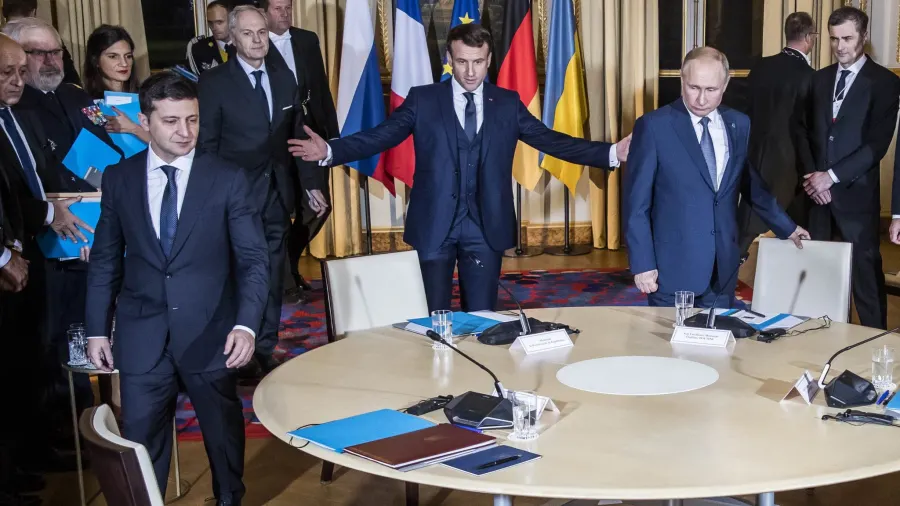
by Ralph Berry
When I wrote here in March on the Russo-Ukrainian war, I took as my text Thucydides’ account of the conflict between Athens and Melos. It seemed obvious to me that the Athenian line must prevail: ‘the strong do what they can, and the weak suffer what they must.’ Since then a vast upsurge of international support for Ukraine has delayed the outcome of the war, all in the name of the ‘rule-based order’ which is held to exist, if only as a fragile ideal. What can be said now is that Melos is devastated, many of its men are killed, and that their womenfolk are driven into exile. They will stay there, pleading the friendships their children have made at school. The ideal, all in the name of ‘independence’, is grotesquely mismatched with the real.
And yet the Establishment backing of the Ukrainian cause scarcely wavers. It reaches into an unlikely realm, spelling. To adapt the key line with which Lord Halifax ends the film DARKEST HOUR, ‘Boris Johnson has mobilized spelling and sent it into battle.’ ‘Kiev’ soon became the oddity ‘Kyiv’, a slight issue for people like me who are fond of Chicken Kiev. But Sainsbury’s soon capitulated to ‘great command’ and I am obliged to buy Chicken Kyiv. The name of Ukraine’s leader has been announced, and adopted by TV, as Volodymr Zelenskyy.
This affectation has been firmly resisted by the old-fashioned print media, who think that one teminal ‘y’ is quite enough. I notice that ‘Odessa’, long famous for its steps in THE BATTLESHIP POTEMKIN, has now become ‘Odesa’. Can there ever be peace for traditional usages?
The contours of the future are now beginning to emerge. The inexpugnable Russia is slowly but surely mastering the battlefield, if at enormous cost. Russian history is full of such victories. The reports of the war in the Western media play up the setbacks, with more enthusiasm than sense. Henry Kissinger’s view that Ukraine must give up land for peace has been received frostily, and yet it is the only way forward. The ever-bellicose media call for a total defeat of Putin and heavy investment in defence–always the heartbeat of the military class, though Russia is no position to pick a fight with anyone else after its Ukraine losses. The supporters’ club includes Yulia Tymoshenko, former Prime Minister of Ukraine, who says ‘We must finish Putin. Appeasement would only lead us into the next war.’ She is certain that ‘the only way out is victory in battle’, more of the war we already have before we can get started on the next war. In WW1 she would be pressing white buttonholes upon ununiformed males.
It is a wonder to me that columnists get paid for the fantasies they get into print. And yet the Telegraph and other organs of the Right think it conceivable that Ukraine will recover every last hectare of its lost land, while Putin is expelled to the steppes which he still owns. Russia is said to be feeling the pain of sanctions; Putin is in fact running a very profitable operation on the wheat and energy deals which he controls, which hurt the Western economies and sustain the Russian.
What is impending is the loss of Donetsk to the Russians. Ukrainian forces have withdrawn from the city of Lysychansk, the last pocket of Luhansk. The Luhansk oblast makes up half of the Donbas, the ultimate prize. The terms in which it is spoken of are of ‘separatism’, the pro-Russian movement there, but a more accurate phrase is ‘secession.’
That would evoke the American Civil War, not a welcome analogue. But the Confederacy had no great protector; the Donbas separatists do.
All this baffles the doctrine to which the ideologues of the West are devoted. It is understood that major voices in the US, Germany, and France, especially Macron, believe that Western support for Ukraine is futile. Vladimir Putin might well reflect: ‘Of course I believe in “rule-based order”. I wrote some of its rules myself.’
- Like
- Digg
- Tumblr
- VKontakte
- Buffer
- Love This
- Odnoklassniki
- Meneame
- Blogger
- Amazon
- Yahoo Mail
- Gmail
- AOL
- Newsvine
- HackerNews
- Evernote
- MySpace
- Mail.ru
- Viadeo
- Line
- Comments
- SMS
- Viber
- Telegram
- Subscribe
- Facebook Messenger
- Kakao
- LiveJournal
- Yammer
- Edgar
- Fintel
- Mix
- Instapaper
- Copy Link








One Response
Einstein, writing on the occasion of the 100th anniversary of the birth of a great Dutch physicist Lorenz, concludes with his recollection of Lorenz telling someone to tried to convince him, at the height of WW1, that only cruelty and violence define the destiny of the world, “you may be right but I would not have liked to live in such a world.”